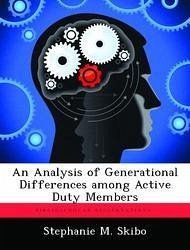There seems to be a widely held belief that different generations have different attitudes toward work, organizations, and co-workers. Clearly, these observed differences have implications for managers and leaders. Actions taken by leaders might be misunderstood by junior organizational members, leading to undesirable outcomes. Considering that many generational groups are represented within the Air Force, there is a need to analyze and understand potential generational differences. With the exception of the Smola and Sutton (2002) study, little empirical research has explored the extent to which these differences actually exist and whether differences exist among Air Force members. This research explores the extent to which differences exist among three generations of Air Force members, and the affects these potential differences have on leadership strategies. The generational groups studied were Baby Boomers (1946-1964), Generation X (1965-1978), and Millennials (1979-1994). Hypotheses were developed based on generational characteristics and tested using a questionnaire that includes 77 items to assess general work attitudes, attitudes towards job and organization, and individual preferences toward work processes.








